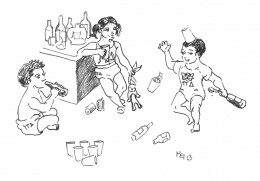
With the recent suspension of Delta Chi, Greek Life and its role on campus is once again in the spotlight. Let’s face the truth, as much as Greek organizations talk about philanthropy and brotherhood, they have one very important role on campus: getting freshmen drunk.
We think that this might even be the driving force pushing many people to join Greek life. If Pipe Dream said that in order to join our staff, you would have to spend a semester being deprived of sleep, eating only what we tell you, drinking to the point where it’s just not fun anymore and catering to the every whim of senior members — oh, and pay us hundreds of dollars in membership and initiation fees — we would have no members.
But Greek life is a freshman’s first experience Downtown; juniors and seniors still remember their maiden voyage to whatever frat added them on Facebook over the summer, the crisp taste of that first Keystone Light, the girl who fell down the stairs and walked away like nothing happened. As a freshman, even if you can’t get into Tom & Marty’s or the Rat, you can still go Downtown, party and get drunk for a mere $5.
Once you join the 21+ crowd, you can purchase your own alcohol and you are guaranteed admission into the bar of your choice. How many juniors and seniors go to frat parties?
But freshman year, especially those first few weeks, gives students a taste of what Greek life has to offer. This is also why there is the push for freshman pledges; Greek organizations want to recruit new members while the organization’s main benefits are still enticing.
On-campus frats may be an accomplice to underage drinking, but they’re not the reason it’s occurring. And frankly, they’re probably providing a safer environment than students would encounter without the option. (Drunken freshmen wandering into Fitzie’s on their first night in Binghamton? That’s just bad news.)
Kids will be kids, and underage students are going to seek out frat parties — and they’ll find them. If the University cracks down on Greek Life too much, we just end up with more Sammys and APES. Pushing frats underground makes them more difficult to supervise and leads to more dangerous activities.
We can learn by example: the 21-year-old drinking age has actually demonstrated similar effects. In 2009, 129 university presidents signed a petition calling for the drinking age to be lowered. They argue that making drinking illegal for most traditional college students has driven drinking underground, promoting a rise in pre-gaming and a decline in phoning for help when something goes wrong.
The same mentality can be applied to off-campus Greek organizations. It may seem proactive to get rid of frats after they’ve had an infraction or two, but what happens in the aftermath? When something major goes awry at an off-campus frat — let’s say, a dangerous hazing activity — will the victim be willing to call for help? Keeping frats under University supervision keeps the lifeline open between the school and the Greeks, and that can be pretty important for college kids prone to dumb mistakes. People do crazy things; remember, you were a drunken freshman once, too.


